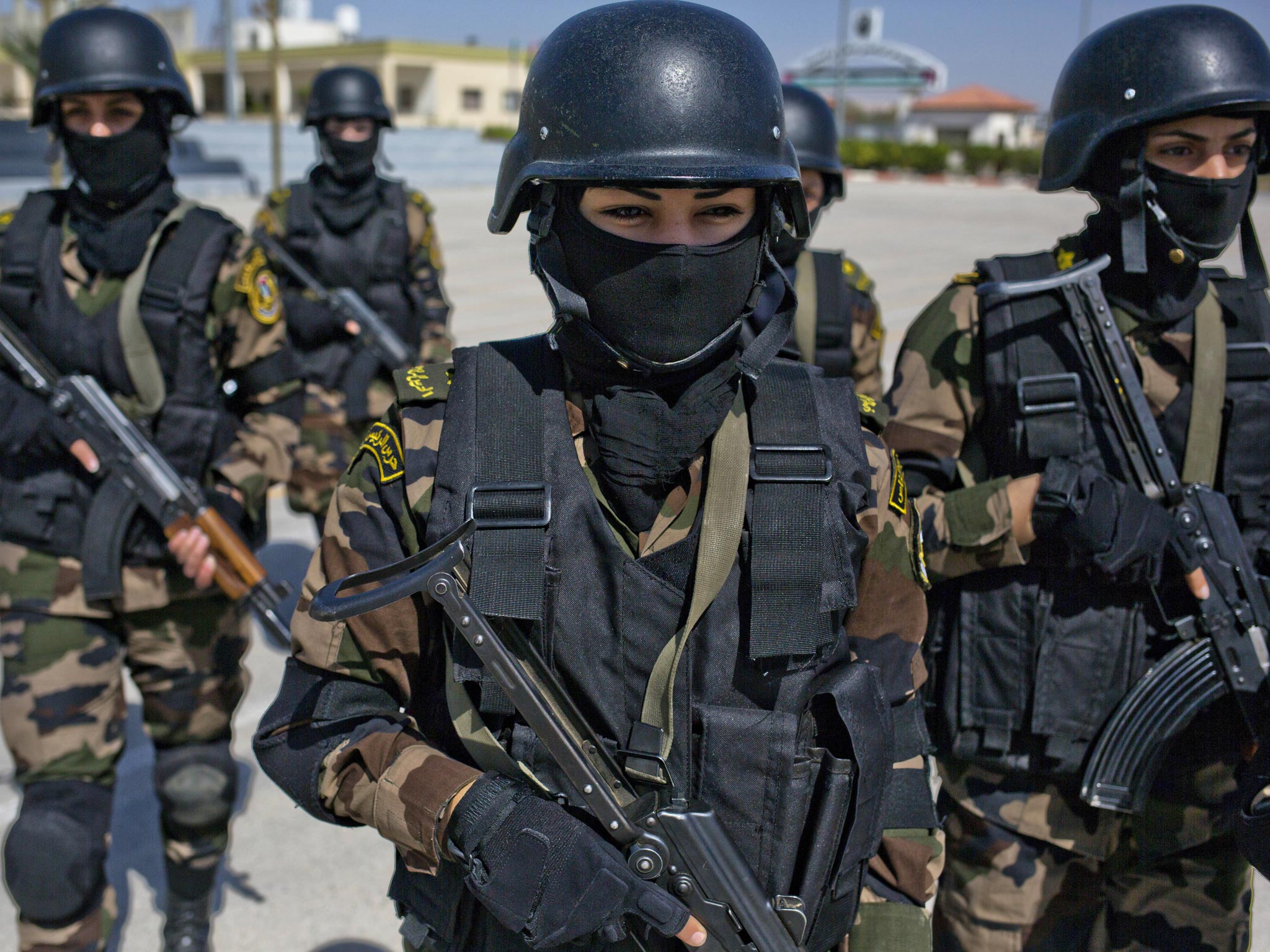Palestinian Presidential Guard unveils its first female fighters - headscarved commandos taking new ground
Gender barriers have fallen in the West Bank, with women assuming posts as mayors, judges and cabinet ministers or starting their own businesses

In combat fatigues and headscarves the women abseil down a six-storey tower, firing assault rifles at imaginary terrorists, then bundle a would-be dignitary into a car and speed off.
The 22 Palestinian commandos are trailblazers in a still largely male-dominated society, set to become the first female members of the Presidential Guard, a Palestinian elite force of 2,600 men.
Their inclusion is the result of gradual changes in the West Bank in recent years. Some gender barriers have fallen, with a few women assuming posts as mayors, judges and cabinet ministers or starting their own businesses. At the same time, unemployment is on the rise, and families are more open to women entering non-traditional jobs.
Women make up just three per cent of the 30,000 members of the Palestinian police and other security agencies in the West Bank, but there is a push to recruit more, according to Brigadier Rashideh Mughrabi, leading gender issues in the National Security Forces.
The new recruits were picked from last year’s graduating class of the Independence University, a four-year security academy in Jericho that trains future officers. For graduate Kurum Saad, the appeal was immediate. As a female officer her traditional role would have been in administration, but she wanted more – adventure and a chance to fire guns. “I didn’t want to sit in an office,” the 23-year-old said. “Since I was a little girl, I loved shooting and sports.”
Two days ago Saad and the others in her group put on black combat boots, camouflage uniforms and pulled black ski masks over the headscarves before showing journalists what they had learned in their special training.
Several women, including non-swimmers, were asked to jump into a pool as a show of courage. They dived in in full uniform, including boots. One had to be pulled out by a lifeguard.
Six women, including Saad, abseiled down the six-storey tower in pairs. Saad, who excelled at sharp shooting, was terrified of heights for months. She said that during training in Jordan with local commandos, she overcame her fear. On Sunday she swiftly made her way down, smiling as she touched ground. Saad said she relished her role of opening doors for other women. Her father, she added, is proud of her, and her little sister is eager to join the Guard.
All but two of the female guards, including Saad, wore black headscarves, reflecting a growing trend among Palestinian women to cover their hair because of tradition, Muslim religious observance or social pressure. As the women performed their drills, hundreds of young men waited in line outside in the brutal desert sun.
They had responded to a recruitment campaign for the Guard, but faced a tough selection process with only a few dozen of the tallest and fittest being chosen.
The Presidential Guard was established under the late Yasser Arafat, the globe-trotting Palestinian leader. Arafat spent most of his life in exile but returned to the Palestinian territories in 1994, as part of interim peace deals with Israel, and set up a self-rule government.
Under his rule, various security branches grew in size, with often overlapping or competing assignments. After his death in 2004, the US and Europe stepped in, training and equipping some of the units as part of an attempt to rein in vigilantes and militants.
Under Arafat’s successor, President Mahmoud Abbas, the guards are engaged in personal protection, including that of visiting dignitaries, but are also trained for anti-terrorism missions.
For now the female guards are only being drawn from the West Bank. In the Gaza Strip, which is not under Abbas’ control and is ruled by the Islamic militant Hamas, about 400 women serve in the 16,000-strong security forces. They have undergone some training, including in martial arts, but work mostly in administrative jobs, including as border control officers and in an anti-drug unit.
The West Bank, Gaza Strip and east Jerusalem were captured by Israel in 1967 and are sought by the Palestinians for a future state.
The Palestinian security force training was meant to help prepare the people for statehood, yet independence remains elusive, with the latest US-led mediation mission appearing to be on the verge of collapse.
Some of the new female guards believe they are serving their homeland, but in the short term there is also the draw of travel and adventure – including a training session in Italy.
Meanwhile, Italian and French trainers are to come to Jericho to teach them stunt driving and more personal protection skills.
The women are to start work at Abbas’ compound in the West Bank city of Ramallah in the summer. They will live in separate quarters from the men, but their work will be the same: personal protection, especially if there are female dignitaries or wives of male visitors.
Rami Sammar, 23, one of their male colleagues, was impressed. “The way I see them, they are performing no less than us, the guys,” he said.
Associated Press
Subscribe to Independent Premium to bookmark this article
Want to bookmark your favourite articles and stories to read or reference later? Start your Independent Premium subscription today.

Join our commenting forum
Join thought-provoking conversations, follow other Independent readers and see their replies